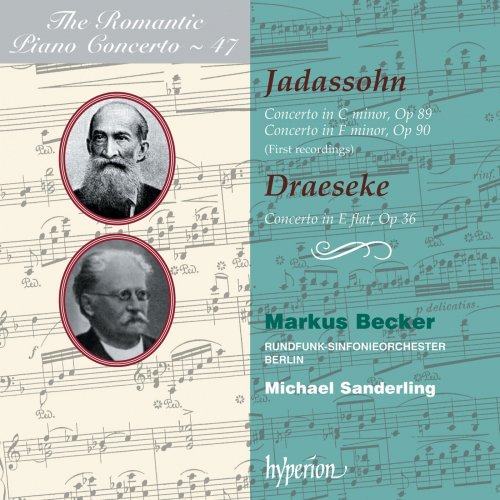
Markus Becker, Rundfunk Sinfonieorchester Berlin, Michael Sanderling - Draeseke & Jadassohn: Piano Concertos (Hyperion Romantic Piano Concerto 47) (2009)
BAND/ARTIST: Markus Becker, Rundfunk Sinfonieorchester Berlin, Michael Sanderling
- Title: Draeseke & Jadassohn: Piano Concertos (Hyperion Romantic Piano Concerto 47)
- Year Of Release: 2009
- Label: Hyperion
- Genre: Classical
- Quality: flac lossless (tracks) +Booklet
- Total Time: 01:09:57
- Total Size: 272 mb
- WebSite: Album Preview
Tracklist
01. Piano Concerto No. 1 in C Minor, Op. 89: I. Introduction quasi recitativo. Allegro appassionato – Andante
02. Piano Concerto No. 1 in C Minor, Op. 89: II. Adagio sostenuto
03. Piano Concerto No. 1 in C Minor, Op. 89: III. Ballade. Allegro patetico – Molto più mosso
04. Piano Concerto No. 2 in F Minor, Op. 90: I. Allegro energico e passionato
05. Piano Concerto No. 2 in F Minor, Op. 90: II. Andantino quasi allegretto – Agitato – Allegro deciso – Andantino
06. Piano Concerto No. 2 in F Minor, Op. 90: III. Allegro appassionato
07. Piano Concerto in E-Flat Major, Op. 36: I. Allegro moderato
08. Piano Concerto in E-Flat Major, Op. 36: II. Adagio
09. Piano Concerto in E-Flat Major, Op. 36: III. Allegro molto vivace
Though barely remembered now, both Salomon Jadassohn and Felix Draeseke were major figures in German musical life in the second half of the 19th century. Both began their studies at the conservative Leipzig Conservatory but after independently encountering Liszt and his work at Weimar in the 1850s both became disciples of that composer and the New German School he established. Jadassohn subsequently returned to Leipzig where he composed and had a long and distinguished teaching career, his pupils including Delius, Grieg and Busoni, while Draeseke finally ended up in Dresden teaching at the Conservatory there.
In a further paralleling of lives, both composers’ concertos were written at almost the same time—Draeseke’s sole example in 1886 and Jadassohn’s two the following year. All three are expertly crafted and feature wonderfully idiomatic piano writing, as one would expect of Liszt pupils. Stylistically they show their links both to Liszt’s single movement forms (Jadassohn 1) and also to more traditional models. While not ground-breaking these are thoroughly enjoyable examples of the genre and one must question why the Jadassohn works in particular, which have truly memorable themes, have been so completely forgotten.
We are delighted to welcome Markus Becker in his first concerto recording for Hyperion; expect more soon!
01. Piano Concerto No. 1 in C Minor, Op. 89: I. Introduction quasi recitativo. Allegro appassionato – Andante
02. Piano Concerto No. 1 in C Minor, Op. 89: II. Adagio sostenuto
03. Piano Concerto No. 1 in C Minor, Op. 89: III. Ballade. Allegro patetico – Molto più mosso
04. Piano Concerto No. 2 in F Minor, Op. 90: I. Allegro energico e passionato
05. Piano Concerto No. 2 in F Minor, Op. 90: II. Andantino quasi allegretto – Agitato – Allegro deciso – Andantino
06. Piano Concerto No. 2 in F Minor, Op. 90: III. Allegro appassionato
07. Piano Concerto in E-Flat Major, Op. 36: I. Allegro moderato
08. Piano Concerto in E-Flat Major, Op. 36: II. Adagio
09. Piano Concerto in E-Flat Major, Op. 36: III. Allegro molto vivace
Though barely remembered now, both Salomon Jadassohn and Felix Draeseke were major figures in German musical life in the second half of the 19th century. Both began their studies at the conservative Leipzig Conservatory but after independently encountering Liszt and his work at Weimar in the 1850s both became disciples of that composer and the New German School he established. Jadassohn subsequently returned to Leipzig where he composed and had a long and distinguished teaching career, his pupils including Delius, Grieg and Busoni, while Draeseke finally ended up in Dresden teaching at the Conservatory there.
In a further paralleling of lives, both composers’ concertos were written at almost the same time—Draeseke’s sole example in 1886 and Jadassohn’s two the following year. All three are expertly crafted and feature wonderfully idiomatic piano writing, as one would expect of Liszt pupils. Stylistically they show their links both to Liszt’s single movement forms (Jadassohn 1) and also to more traditional models. While not ground-breaking these are thoroughly enjoyable examples of the genre and one must question why the Jadassohn works in particular, which have truly memorable themes, have been so completely forgotten.
We are delighted to welcome Markus Becker in his first concerto recording for Hyperion; expect more soon!
As a ISRA.CLOUD's PREMIUM member you will have the following benefits:
- Unlimited high speed downloads
- Download directly without waiting time
- Unlimited parallel downloads
- Support for download accelerators
- No advertising
- Resume broken downloads


